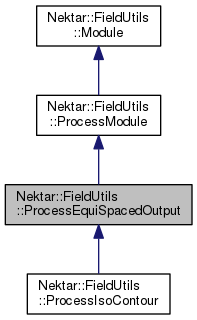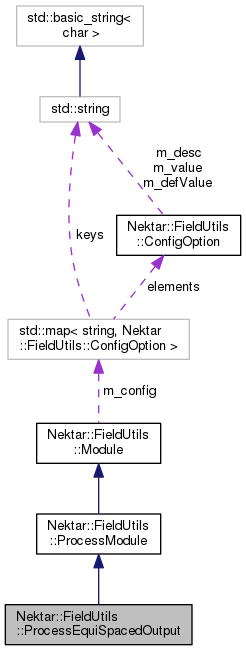|
Nektar++
|
|
Nektar++
|
This processing module interpolates one field to another. More...
#include <ProcessEquiSpacedOutput.h>


Static Public Member Functions | |
| static boost::shared_ptr< Module > | create (FieldSharedPtr f) |
| Creates an instance of this class. More... | |
Static Public Attributes | |
| static ModuleKey | className |
Protected Member Functions | |
| ProcessEquiSpacedOutput () | |
| void | SetupEquiSpacedField (void) |
| void | SetHomogeneousConnectivity (void) |
| void | GenOrthoModes (int n, const Array< OneD, const NekDouble > &phys, Array< OneD, NekDouble > &coeffs) |
 Protected Member Functions inherited from Nektar::FieldUtils::Module Protected Member Functions inherited from Nektar::FieldUtils::Module | |
| Module () | |
Additional Inherited Members | |
 Protected Attributes inherited from Nektar::FieldUtils::Module Protected Attributes inherited from Nektar::FieldUtils::Module | |
| FieldSharedPtr | m_f |
| Field object. More... | |
| map< string, ConfigOption > | m_config |
| List of configuration values. More... | |
| bool | m_requireEquiSpaced |
This processing module interpolates one field to another.
Definition at line 49 of file ProcessEquiSpacedOutput.h.
| Nektar::FieldUtils::ProcessEquiSpacedOutput::ProcessEquiSpacedOutput | ( | FieldSharedPtr | f | ) |
Definition at line 60 of file ProcessEquiSpacedOutput.cpp.
References Nektar::FieldUtils::Module::m_config.
|
virtual |
Definition at line 72 of file ProcessEquiSpacedOutput.cpp.
|
inlineprotected |
Definition at line 71 of file ProcessEquiSpacedOutput.h.
|
inlinestatic |
Creates an instance of this class.
Definition at line 53 of file ProcessEquiSpacedOutput.h.
References Nektar::MemoryManager< DataType >::AllocateSharedPtr().
|
protected |
Definition at line 848 of file ProcessEquiSpacedOutput.cpp.
References ASSERTL0, Nektar::LibUtilities::eOrtho_A, Nektar::LibUtilities::eOrtho_B, Nektar::LibUtilities::eQuadrilateral, Nektar::LibUtilities::eTriangle, Nektar::StdRegions::StdExpansion::FwdTrans(), Nektar::LibUtilities::Interp2D(), and Nektar::FieldUtils::Module::m_f.
Referenced by SetupEquiSpacedField().
|
inlinevirtual |
Implements Nektar::FieldUtils::Module.
Definition at line 65 of file ProcessEquiSpacedOutput.h.
|
virtual |
Write mesh to output file.
Implements Nektar::FieldUtils::Module.
Reimplemented in Nektar::FieldUtils::ProcessIsoContour.
Definition at line 76 of file ProcessEquiSpacedOutput.cpp.
References SetupEquiSpacedField().
Definition at line 461 of file ProcessEquiSpacedOutput.cpp.
References ASSERTL0, Nektar::StdRegions::eForwards, Nektar::LibUtilities::eFourier, Nektar::LibUtilities::eFourierEvenlySpaced, Nektar::LibUtilities::ePtsTetBlock, Nektar::LibUtilities::ePtsTriBlock, Nektar::LibUtilities::eQuadrilateral, Nektar::LibUtilities::eTriangle, Nektar::LibUtilities::StdTriData::getNumberOfCoefficients(), Nektar::LibUtilities::StdQuadData::getNumberOfCoefficients(), Nektar::FieldUtils::Module::m_f, npts, CellMLToNektar.cellml_metadata::p, Vmath::Sadd(), and Vmath::Vcopy().
Referenced by SetupEquiSpacedField().
Definition at line 81 of file ProcessEquiSpacedOutput.cpp.
References Nektar::MemoryManager< DataType >::AllocateSharedPtr(), ASSERTL0, Nektar::StdRegions::eBwd, Nektar::StdRegions::eDir1BwdDir1_Dir2BwdDir2, Nektar::StdRegions::eDir1BwdDir1_Dir2FwdDir2, Nektar::StdRegions::eDir1BwdDir2_Dir2BwdDir1, Nektar::StdRegions::eDir1BwdDir2_Dir2FwdDir1, Nektar::StdRegions::eFwd, Nektar::LibUtilities::eHexahedron, Nektar::LibUtilities::ePrism, Nektar::LibUtilities::ePtsSegBlock, Nektar::LibUtilities::ePtsTetBlock, Nektar::LibUtilities::ePtsTriBlock, Nektar::LibUtilities::ePyramid, Nektar::LibUtilities::eQuadrilateral, Nektar::LibUtilities::eSegment, Nektar::LibUtilities::eTetrahedron, Nektar::LibUtilities::eTriangle, GenOrthoModes(), Nektar::LibUtilities::StdSegData::getNumberOfCoefficients(), Nektar::LibUtilities::StdTriData::getNumberOfCoefficients(), Nektar::LibUtilities::StdQuadData::getNumberOfCoefficients(), Nektar::LibUtilities::StdHexData::getNumberOfCoefficients(), Nektar::LibUtilities::StdTetData::getNumberOfCoefficients(), Nektar::LibUtilities::StdPyrData::getNumberOfCoefficients(), Nektar::LibUtilities::StdPrismData::getNumberOfCoefficients(), Nektar::FieldUtils::Module::m_config, Nektar::FieldUtils::Module::m_f, npts, Nektar::NullNekDouble1DArray, Nektar::LibUtilities::NullPtsField, and SetHomogeneousConnectivity().
Referenced by Process(), and Nektar::FieldUtils::ProcessIsoContour::Process().
|
static |
Definition at line 57 of file ProcessEquiSpacedOutput.h.
 1.8.8
1.8.8